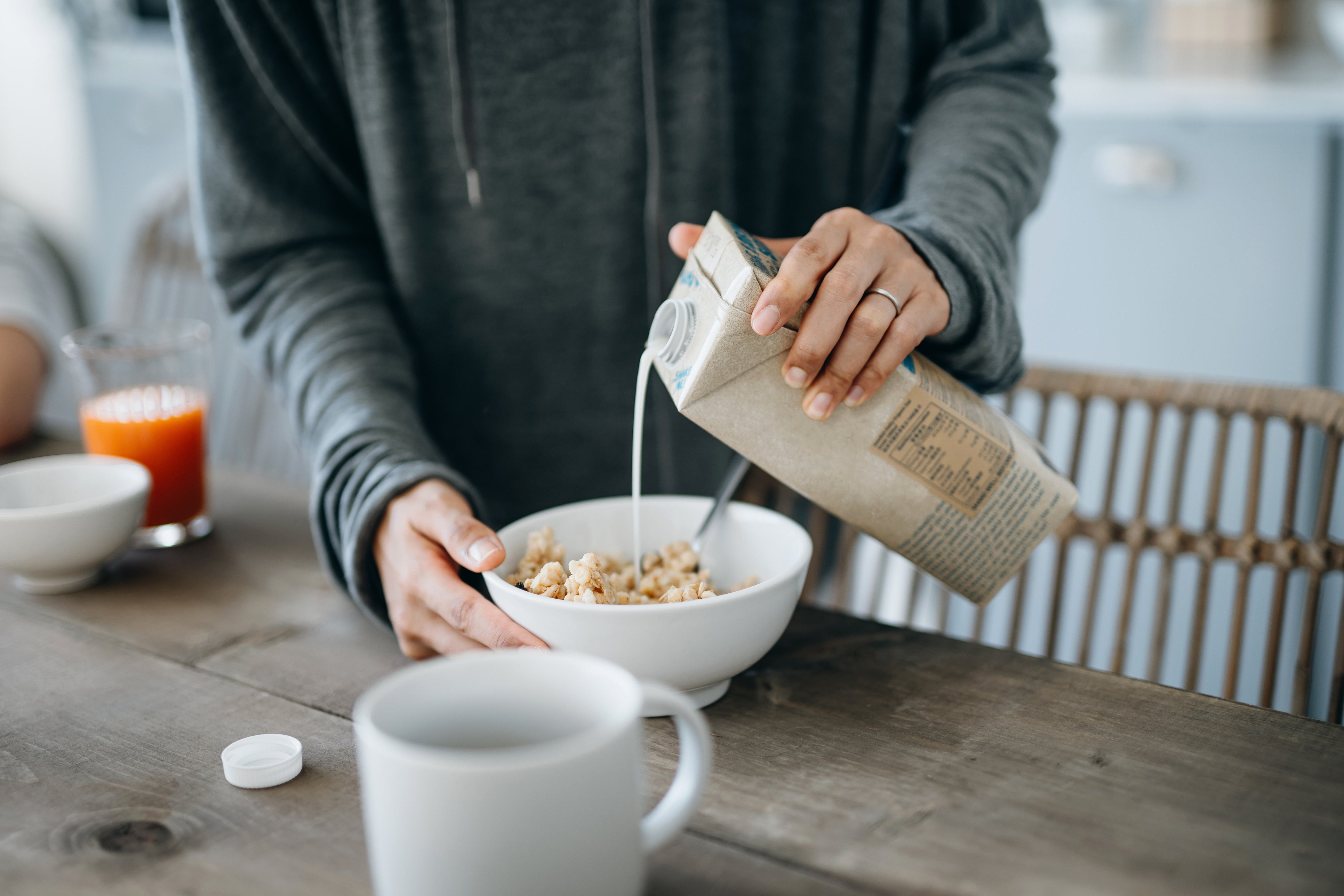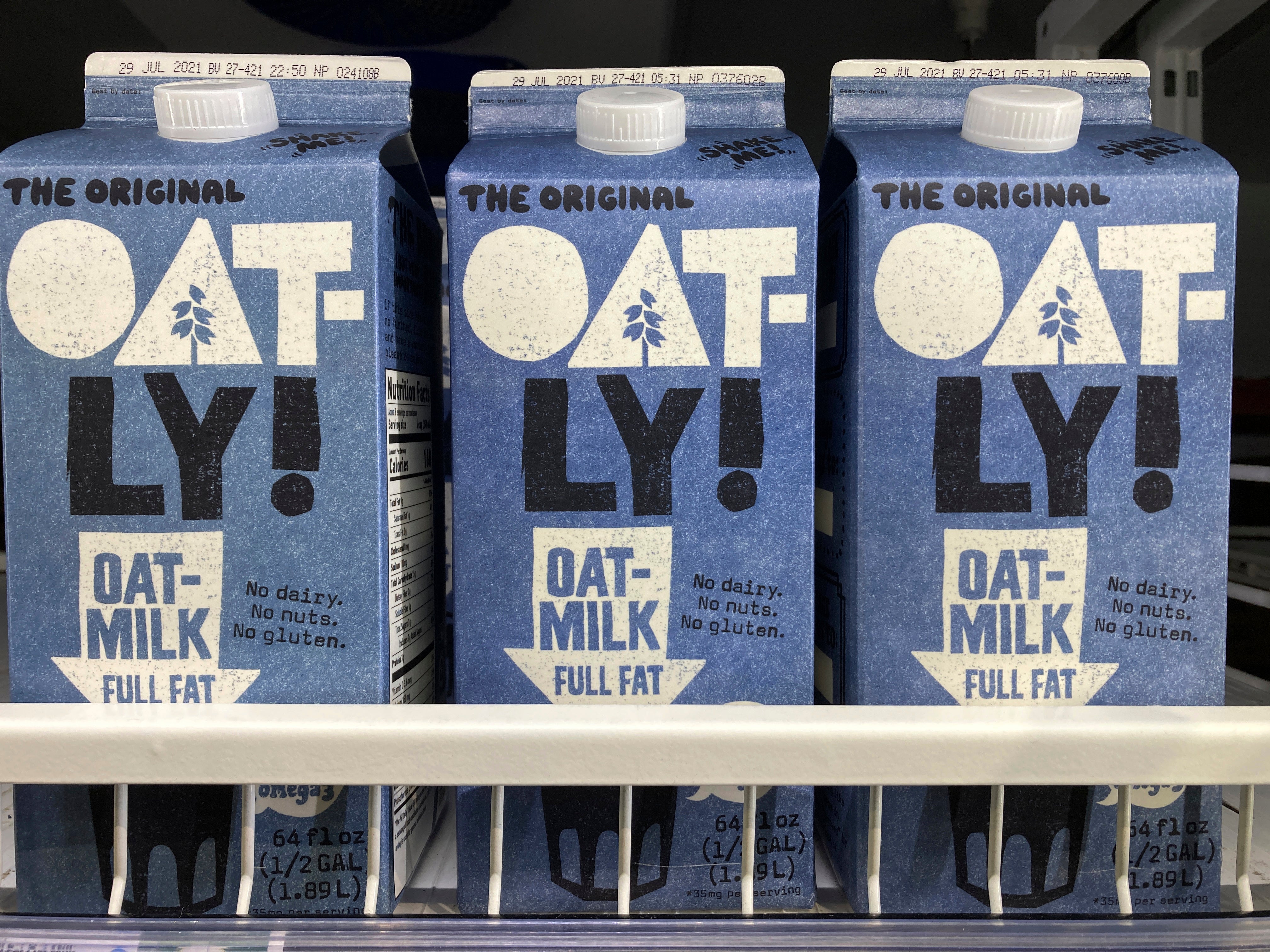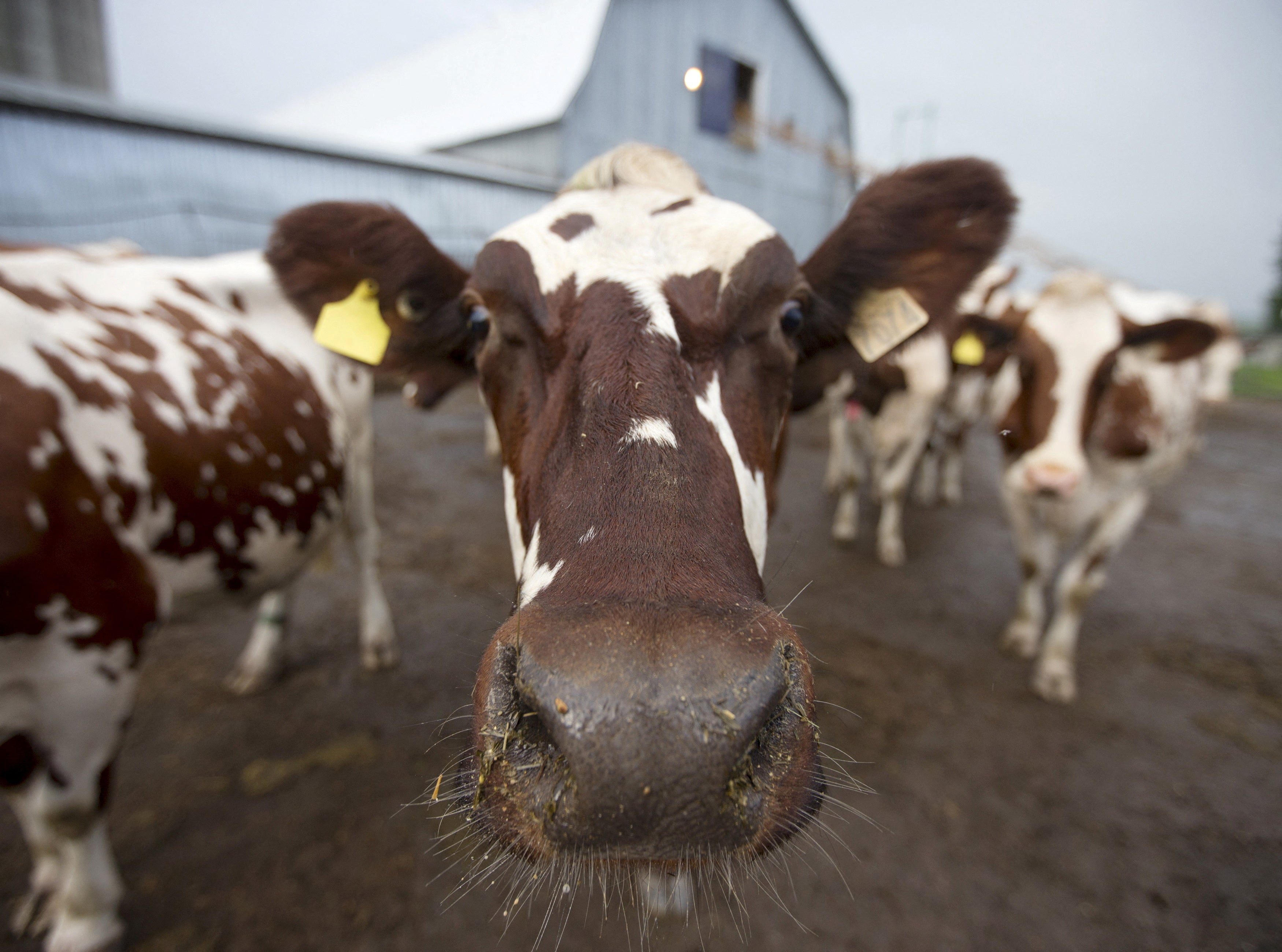The Independent's journalism is supported by our readers. When you purchase through links on our site, we may earn commission.
The rise and fall of oat milk: Has the trendiest dairy alternative finally fallen from grace?
Previously the darling of the vegan world, oat milk has faced a reckoning of late. With nutritionists and environmentalists alike levelling criticism, Helen Coffey investigates whether we should really be swerving the coolest alt-milk on the block


Oh God – not another milk I’m not allowed to drink!” A friend uttered these exasperated words earlier this week, followed by the deepest of sighs. She, like so many people trying to do the “right thing” only to come up short, is exhausted.
She was responding to a viral video that’s probably the best takedown of oat milk to grace the internet. Others have tried; all have failed. But actor Drea Valls’s video, “Cow’s milk when she hears you’ve quit oat,” in which she anthropomorphises the former as a spurned woman, has confirmed what some had already seen coming: the inevitable fall from grace of the trendiest dairy alternative on the block.
“Well, well, well,” Valls says, like an EastEnders villainess complete with fur coat and fake cigarette. “Look who’s come crawling back… Had enough of her spiking your glucose, have you? I should have known what you were up to from the start, all them years ago. Stopped ordering me in your Costa; started ordering her instead.”
The inspired monologue, which has racked up more than 300,000 views on Instagram at the time of writing, contains the immortal lines: “So what’s changed, hmm? You sick of her being the toxic one now, yeah? She’s the one that’s bad for the environment. I feel sorry for her. Poor b***h.”
It neatly encapsulates the increasing criticism levelled at oat milk, previously the alt-milk darling that could do no wrong. Historically advertised as a “healthy” drink, it’s recently come under fire from some nutritionists. In a high-profile interview with American entrepreneur Marie Forleo that’s garnered 4.3 million views on TikTok, Jessie Inchauspé – the French biochemist and New York Times bestselling author also known as the “Glucose Goddess” – gave the following damning assessment: “Oat milk comes from oats, and oats are a grain, and grains are starch. When you’re [drinking] oat milk, you’re [drinking] starch juice. You’re [drinking] juice with a lot of glucose in it. So it leads to a big glucose spike.”

“If you have milk that comes from a cow, that’s mostly protein and fat,” she continues. “If you have milk that comes from a nut, that’s also very, very low in starch. Those are better options in terms of glucose-balancing properties. If you’re having oat milk because you think it’s healthier, just switch. Go back to whole milk or have some unsweetened nut milk.”
I’ll hold my hands up – as a committed cow’s milk drinker (to the extent that I’ll happily chug a half-pint of the white stuff as a “treat”), part of me is revelling in the schadenfreude of it all. After years of one colleague double checking I wanted my coffee “with cruelty juice” every time he made me a drink, the holier-than-thou, halo-topped oat milk is finally, finally having its day of reckoning. But is it really worse for our health than cow’s milk – or its vegan rivals?
“It’s pretty much all carbohydrates,” functional medicine and nutrition specialist Sarah Carolides tells me. “There are 15-20g of carbs per glass compared to around 8g of carbs in a glass of cow’s milk. It also has 2.5g of protein per glass, about 4g of unsaturated fat, and about 2g of fibre. Cows’ milk has a lot more protein – between 8 and 10g per glass – and it’s a source of complete protein.”
Nutrition-wise, problems with oat milk can arise for three main reasons, she says: the fibre; the amount of sugar/fast-releasing carbohydrates; and the additives, emulsifiers, sugars and flavourings that some commercial brands add. “Bloating is likely to happen because of both the fibre and sugary carbohydrates in the oat milk,” she warns. “If someone has an imbalance with the bacteria in their gut, the ‘harmful’ bacteria can enjoy feasting on the soluble fibre and oligosaccharides that the oat milk provides. This is a type of fermentation that produces gas and causes bloating.”

Unsurprisingly, Oatly, the leading brand of oat milk – which currently has a net worth over $675m (£529m) – is clapping back against claims it’s not good for glucose intake. “In line with the scientific community, we analyse glycaemic load (GL), which considers both the blood sugar level response and the effect of an average serving size,” says Caroline Orfila-Jenkins, VP science and technology at Oatly. “One large glass of Oatly Barista Edition (240ml) or a dash in your coffee (100ml) is considered in the ‘low category’ for glycaemic load and on a par with cow’s milk.” A 240ml glass of Oatly Barista Edition has a GL of nine, says Orfila-Jenkins. “By way of comparison, a typical fizzy soda drink (240 ml) has a GL of around 17, which is ‘medium’,” she adds.
Dr Federica Amati, head nutritionist at Zoe, the personalised nutrition company and author of Every Body Should Know This and Recipes for a Better Menopause, says that, while many plant milks, including oat milk, can be heavily processed and may include a wide range of ingredients you wouldn’t find in a kitchen, “most people only drink them in small quantities, and the fortified versions offer vegans and children beneficial nutrients”. Unsweetened oat milk does contain more sugar than some alternatives, like soy and almond milk, she says. “However, when comparing products, it’s important to consider the full range of nutrients and the level of processing. If you are drinking occasionally in your tea or coffee, go for the one you like the taste of the most and if you don’t have diabetes don’t worry too much about sugar spikes; your body will likely be able to handle it.”
If you don’t have diabetes, don’t worry too much about sugar spikes; your body will likely be able to handle it
Research conducted by her colleague Dr Sarah Berry shows that when we consume oats that have been finely ground – as they are in oat milk – they do cause a larger blood sugar response than after eating large whole oats. “This is normal as the food matrix has been destroyed, making the sugars easier to absorb,” says Dr Amati. “However, everyone responds differently to food; something that causes a large rise in one person’s blood sugar might not for someone else. If you do drink oat milk, try to choose products that don’t contain too many other ingredients, like sweeteners, thickening agents and emulsifiers.”
But what of oat milk’s claim to have one of the lowest environmental impacts? Generally speaking, it’s accepted that oat milk has a smaller carbon footprint than most of the alternatives. “Cow’s milk uses significantly more land and water than oat and other plant milks per litre of milk,” says not-for-profit co-operative, The Ethical Consumer. “It also creates significantly more greenhouse gas emissions per litre of milk than oat or other plant milks. Figures from Our World in Data indicate oat milk uses 13 times less water, and 11 times less land to produce one litre of milk compared with cow’s milk.” But the Ethical Consumer adds that “to consider environmental impacts holistically requires an understanding of production methods, which often is ignored. It’s complex, and videos like [Valls’s] just make the discussion binary.” And binary is undoubtedly bad, whichever way you slice it. Just as almond milk came under fire for its high water footprint and consequent depletion of California’s groundwater sources, oat milk’s story also has more layers to it.
It’s not the cow, it’s the how... if you buy milk from an organic or regenerative dairy farm, this can be beneficial for the environment and biodiversity
“We need to consider the full environmental impact as well as nutrition,” Lizzie Rivera, founder of ethical and sustainable lifestyle guide Live Frankly, tells me. “It depends on how the oats are grown – if they are not organic, there is a good chance they have been farmed with [herbicide] glyphosate, which is devastating for the environment and our health.” Oatly says its product is glyphosate-free. Two out of 13 popular brands of oat milk in the US had detectable levels of glyphosate, according to a 2023 report from Mamavation: Malk Organic Oat Milk and Silk Extra Creamy Oatmilk.
When it comes to dairy milk, “it’s not the cow, it’s the how,” says Rivera. “If you’re buying dairy milk from an industrial farm then the environment and animal welfare are huge issues. But if you buy milk from an organic or regenerative dairy farm, this can be beneficial for the environment and biodiversity – and the cows can even be part of a system that helps to draw carbon from the atmosphere and store it in the soil.”

The Soil Association also extols the virtues of cow’s milk, provided it’s organic. “Organic dairy farming uses practices which are mindful towards the environment, such as rotational grazing to make sure fields aren’t overgrazed by the herd, keeping soils healthy and as a result more effective at sequestering carbon dioxide out of the atmosphere, helping reduce the effects of climate change,” it says.
Meanwhile, the majority of oats in oak milk “are produced in intensive farming systems, often overseas, where they are a single crop with significantly reduced levels of biodiversity”, adds the Soil Association. This issue of highly industrialised farming and the subsequent creation of a monoculture – where vast tranches of land are used to grow one singular crop, stripping out biodiversity and having a detrimental effect on pollinators – is an issue with nearly all vegan milk alternatives, including soy and nut-based varieties.
But, to quote the old adage, “don’t let perfect be the enemy of good”: plant-based milks are still better, across most environmental criteria, than the vast majority of cow’s milk that’s produced from highly industrialised farms.
Viral videos are all well and good, but whether it’s a woman swathed in fur channelling her inner dairy drama queen or a French biochemist talking in TikTok-friendly soundbites, anything that strips issues down to a binary good/bad debate is probably misleading. Like the classic Facebook relationship status of circa 2006, when it comes to milk: “it’s complicated”.
Join our commenting forum
Join thought-provoking conversations, follow other Independent readers and see their replies
Comments


Bookmark popover
Removed from bookmarks